

How to Deal With Workplace Stress. Feeling stressed at work?
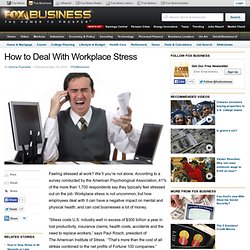
We’ll you’re not alone. According to a survey conducted by the American Psychological Association, 41% of the more than 1,700 respondents say they typically feel stressed out on the job. Workplace stress is not uncommon, but how employees deal with it can have a negative impact on mental and physical health, and can cost businesses a lot of money.
“Stress costs U.S. industry well in excess of $300 billion a year in lost productivity, insurance claims, health costs, accidents and the need to replace workers,” says Paul Rosch, president of The American Institute of Stress. “That’s more than the cost of all strikes combined or the net profits of Fortune 100 companies.” Workplace stress can cause chronic headaches, gastrointestinal problems, heart attack, strokes, depression and anxiety to name a few ailments, according to experts. Symptoms of Workplace Stress. Workplace Stress - Stress Management. In many countries, employers have a legal responsibility to recognise and deal with stress in the workplace so that employees do not become physically or mentally ill.
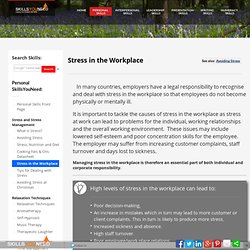
Occupational Stress and the Workplace. 7 Apps To Beat Stress In The Workplace. The American Institute of Stress. Numerous studies show that job stress is far and away the major source of stress for American adults and that it has escalated progressively over the past few decades.
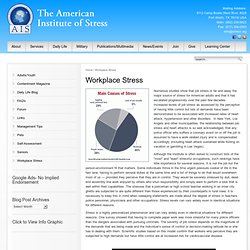
Increased levels of job stress as assessed by the perception of having little control but lots of demands have been demonstrated to be associated with increased rates of heart attack, hypertension and other disorders. In New York, Los Angels and other municipalities, the relationship between job stress and heart attacks is so well acknowledged, that any police officer who suffers a coronary event on or off the job is assumed to have a work related injury and is compensated accordingly (including heart attack sustained while fishing on vacation or gambling in Las Vegas).
Although the Institute is often asked to construct lists of the “most” and “least” stressful occupations, such rankings have little importance for several reasons. It is not the job but the person-environment fit that matters. View NIOSH Report. Stress in the Workplace: A Costly Epidemic. FDU · publications · FDU Magazine · calendar of events · help by Rebecca Maxon Three out of every four American workers describe their work as stressful.
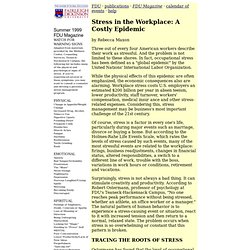
And the problem is not limited to these shores. In fact, occupational stress has been defined as a "global epidemic" by the United Nations' International Labor Organization. While the physical effects of this epidemic are often emphasized, the economic consequences also are alarming. Workplace stress costs U.S. employers an estimated $200 billion per year in absen teeism, lower productivity, staff turnover, workers' compensation, medical insur ance and other stress-related expenses.
Of course, stress is a factor in every one's life, particularly during major events such as marriage, divorce or buying a home. Led To Tragedy. Intimidation. Threats. Berating. Teasing. Overworking. These are just some of the many issues victims of workplace bullying endure on a day-to-day basis. Horror stories of bullied kids killing themselves to be free of the constant torment they face from peers have even pushed several states to create laws against bullying, encouraging individuals to report school bullying incidents to authorities.
Singled out? Workplace bullying, economic insecurity, and the unmarried woman « Minding the Workplace. Here’s my hypothesis, and I’m wondering if somewhere there’s a good study that brings together these strands: When it comes to workplace bullying and economic insecurity exacerbated by the Great Recession, single women — especially those with dependents — face a sort of double jeopardy.
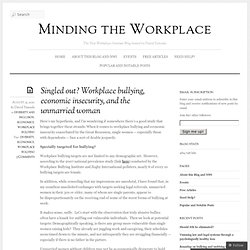
Employee Happiness Matters More Than You Think. Pro: Bring on the Smiles, Count the Profits by Teresa Amabile and Steven Kramer, The Progress Principle Productivity measures across national economies have captivated the attention of policy makers and executives alike.
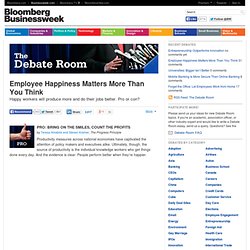
Ultimately, though, the source of productivity is the individual knowledge workers who get things done every day. And the evidence is clear: People perform better when they’re happier. The Sharp Drop-Off In Worker Happiness. A friend of mine resigned his long-time bank management job this week to take early retirement.
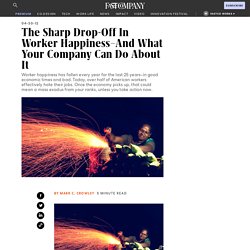
I learned about it on Facebook. As I began reading his announcement, I fully expected it to be an animated recounting of all the new hobbies he planned to pursue and exotic trips he intended to take. But it quickly became clear that this was no ordinary farewell note. He was truly upset about ending his career prematurely and wanted everyone close to him to understand why. It was painful to discover that my former colleague had grown profoundly disheartened by the way his organization’s leadership had been treating him. “I felt like no one cared about me as a person there, and finally decided to extricate myself from the grind.
There was a sense of relief in his words, as if I was reading about someone who had been imprisoned, found an escape route, and wanted to show others the way to freedom. But it’s the past four years that have brought employee discontent to new and highly charged levels.